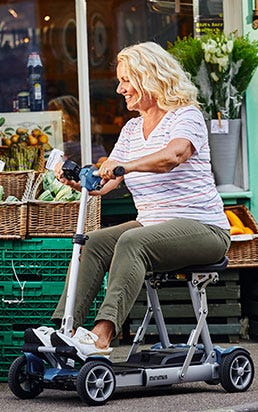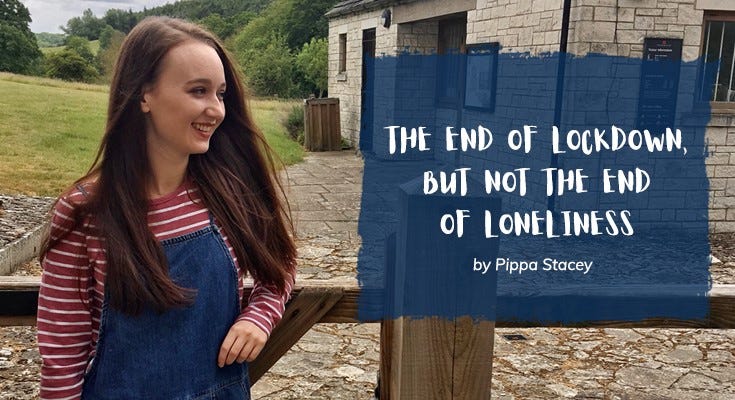Like many people, I felt cautiously optimistic about the recent plans outlined for the UK’s ‘roadmap’ out of lockdown.
More and more of the UK population are being vaccinated every day, coronavirus infection rates are slightly beginning to fall, and some semblance of an ‘end’ to all of this is in sight. Even while the announcement was taking place, I felt a spark of joy as messages, group chats, and social media threads sprung to live with excitement at the prospect of future plans. It wasn’t until a little later that it hit me.
This roadmap out of lockdown, no matter how long it takes or what it ends up looking like, is going to be somewhat bittersweet for many disabled and chronically ill people. Many of us have faced loneliness throughout this whole ordeal… but for me, I worry that the loneliest part is yet to come.
Let me try and explain. I have an energy-limiting chronic illness, and because of necessary pacing and activity management to keep on top of my symptoms, I’m primarily based at home. I work from home, socialise from home, and do my best to live a full and happy life from home… more so than ever at the moment, since my ‘tolerance’ for the outside world has decreased due to the impact of shielding over the last year.
Although the circumstances behind it were dire and something I would never wish upon the world, there’s been something oddly comforting about seeing the non-disabled population recalibrate their lives so they’ve been primarily based at home too. Studying and working remotely became the norm, phone and video calls were our only viable methods of socialising, and the entertainment and leisure sectors adapted so that activities became more accessible, meaning people could join in without having to leave the house.
It’s only now, looking back at the last year, that it’s really hit me – the lockdown period was the first time I didn’t feel somewhat ‘abnormal’ for having a chronic illness that meant all of the above have always been more of a necessity. Over the next few months, people are going to be urging for things to get back to how they were before. And in a sense, I am too.
I cannot wait to bring out my electric wheelchair (who I call Janice) out from under her storage cover in her current state of hibernation, get her batteries charged and feel like I’m part of the world beyond these four walls once more.
At the same time, however, I think it’s going to feel difficult to watch our society evolve back into an environment that systematically excludes disabled and chronically ill people, even more than they already have been by the invisible challenges during this pandemic. It’s going to hurt, watching friends and loved ones reunite and go on nights out when more often than not I don’t feel well enough to join in.
I’m already dreading seeing the photos and social media posts the next day and the FOMO once again hitting in full force. It’s going to be tough watching people book holidays and new adventures when the tourism industry is still so inaccessible for those with additional needs… not to mention that the financial impact of the pandemic has hit many disabled people particularly deeply.
Such luxuries have become out of the question for the individuals who in my opinion deserve a change in scenerymore than anything. It’s going to affect me deeply if all of the progress we’ve made with changing perceptions of working from home and remote learning is suddenly undone when more people return to physical places of work and study.
We mustn’t let the lessons learned go to waste and the experiences of those with long-term health conditions become compromised once more. Quite frankly, there isn’t a great deal of advice I feel I can personally offer at this stage. More than anything, I wanted to make sure that anybody who might be feeling a similar way right now knows that they’re far from alone.
It’s completely okay to feel hopeful and optimistic about the future and worry about the impact the transition will have on you at the same time. There have been some really valuable conversations about mental health taking place over the course of this pandemic, and I hope that support and guidance remains in place during and after this journey out of lockdown and back towards some semblance of ‘normality’.
We all know that loneliness has a huge impact on our mental health, and the social isolation that many disabled people will face even as restrictions on socialising are lifted is no exception to this. Keeping mobile is a key aspect to maintaining good mental health, and it’s going to be tough for those of us who that whilst we can legally go anywhere we want, our health needs mean we still have to stay where we are.
I hope that wellbeing services remain accessible for all, not only for disabled adults but for elderly people too – another population who’ve borne the brunt of the stringent lockdown measures longer and even more tediously than many. If you’re struggling with your mental health, this comprehensive list of helplines on the NHS website may be worth a look at.
Please don’t ever be afraid of picking up the phone and reaching out for support. More than anything though, I hope for acknowledgement that this particular part of this ever-evolving story also poses many, many challenges for the disability and chronic illness community.
There may be a roadmap out of lockdown in place, but there isn’t yet a roadmap for the loneliness that may well accompany it. I just hope with everything in me that you, reading this right now, know that you’re not alone.
Your struggles are valid, and I believe in you. We can and will get through this.
If you enjoyed this post, you may find this YouTube webinar about Life After Lockdown (filmed last summer after lockdown one!) helpful – a chat with Dr Sue Pemberton of Yorkshire Fatigue Clinic about the unique challenges of re-adapting to life as we knew it alongside managing a chronic illness. Do feel free to join in the conversation over on social media too!


 Price Match Promise
Price Match Promise
 Next day delivery, 7 days a week
Next day delivery, 7 days a week
 Nationwide Showrooms
Nationwide Showrooms
 Rated Excellent
Rated Excellent







